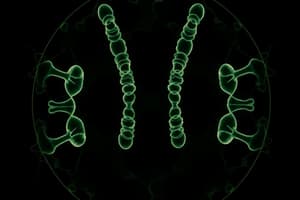Podcast
Questions and Answers
Who proposed the concept of idioplasm?
Who proposed the concept of idioplasm?
- Gregor Mendel
- Carl Wilhelm von Nägeli (correct)
- Robert Hooke
- Louis Pasteur
What did Robert Hooke discover through microscopy?
What did Robert Hooke discover through microscopy?
- Atoms
- Cells (correct)
- Proteins
- Genes
Which theory states that all organisms are composed solely of cells or their products?
Which theory states that all organisms are composed solely of cells or their products?
- Quantum Theory
- Cell Theory (correct)
- Big Bang Theory
- Evolution Theory
What process leads to the introduction of variation in offspring populations?
What process leads to the introduction of variation in offspring populations?
During which reproductive event do diploid and haploid stages alternate in multicellular organisms?
During which reproductive event do diploid and haploid stages alternate in multicellular organisms?
What is the process that introduces genetic variation in offspring?
What is the process that introduces genetic variation in offspring?
What is the function of fertilization in sexual reproduction?
What is the function of fertilization in sexual reproduction?
Which process produces genetically unique reproductive cells in meiosis?
Which process produces genetically unique reproductive cells in meiosis?
What can errors during meiosis lead to?
What can errors during meiosis lead to?
Which process involves the fusion of haploid gametes to form a zygote?
Which process involves the fusion of haploid gametes to form a zygote?
What type of cell division ensures that each daughter cell receives only half the number of chromosomes as the parent cell?
What type of cell division ensures that each daughter cell receives only half the number of chromosomes as the parent cell?
Study Notes
The Cellular Basis of Inheritance
The cellular basis of inheritance refers to the biological processes that transmit genetic information from parent organisms to their offspring. These processes involve meiosis, fertilization, and various other aspects of cell biology.
Sexual Reproduction
Most eukaryotes reproduce sexually, which involves the fusion of haploid gametes from two individuals to form a diploid zygote. This process introduces variation into the genetic makeup of offspring, which is believed to be one of the advantages of sexual reproduction. During meiosis, each chromosome is duplicated, and the parent's genetically unique reproductive cells are produced. Fertilization restores the diploid condition in the zygote.
Meiosis
Meiosis is a series of events that arrange and separate chromosomes into four nuclei and usually four haploid daughter cells. It consists of two rounds of nuclear division (meiosis I and Meiosis II) and ensures that each daughter cell receives only half the number of chromosomes as the parent cell. Errors during meiosis can lead to aneuploidies, or disorders in chromosome number, which are typically lethal to embryos but may have milder effects on an individual due to X inactivation.
The Cellular Basis of Inheritance: An Overview
The development of cytology, including the study of cell structure and function, provides insights into the cellular basis of inheritance. Early scientists like Robert Hooke discovered cells through microscopy, paving the way for understanding cellular processes such as cell division and heredity.
Carl Wilhelm von Nägeli proposed the concept of idioplasm, an invisible chemical network thought responsible for inheritance. Although this material was not observed in cells at the time, it provided a framework for understanding how genetic information could be passed down across generations.
Today, we recognize that all organisms are composed solely of cells or their products (the cell theory). Multicellular organisms employ different life-cycle strategies, with diploid and haploid stages alternating during sexual reproduction. Variation is introduced during meiosis, and when gametes combine in fertilization, leading to diverse offspring populations.
Studying That Suits You
Use AI to generate personalized quizzes and flashcards to suit your learning preferences.
Description
Explore the cellular processes of meiosis, fertilization, and genetic inheritance that underlie the transmission of genetic information from parent organisms to offspring. Learn about the advantages of sexual reproduction, the significance of meiosis in creating genetically unique reproductive cells, and the role of fertilization in restoring the diploid condition in zygotes.




